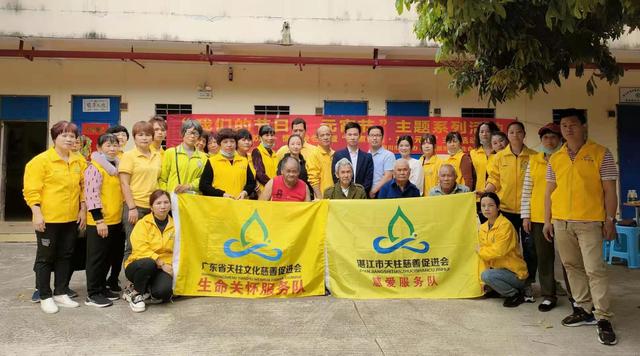








It is reported that the Lantern Festival Gala in 2022, just past the Central Radio and Television Station, came to a successful conclusion. This gala combines traditional cultural concepts with high technology, pushing the visual appreciation of the gala and the enthusiasm of the audience to a climax, presenting an ultimate double enjoyment of hearing and vision.
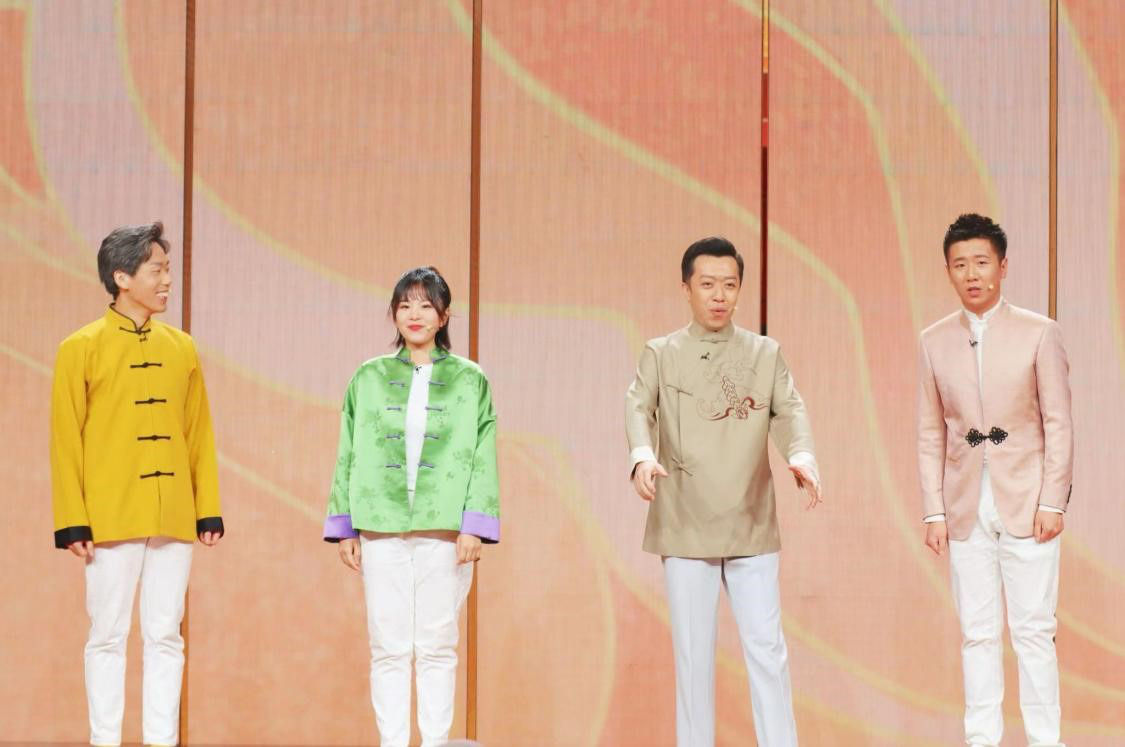
The creative program "Selling Tangyuan" uses a combination of symphony and crosstalk to interpret the classic melody and evoke the familiar taste of Yuanxiao in the audience’s heart. Singer Wang Leixi, as the only female crosstalk performer, is a striking presence in this program. Many people use allegro or "Go online! Huacai Teenager knows her, and it’s very surprising to perform cross talk on CCTV again this time. Wang Leixi appeared at the Lantern Festival party this time, and collaborated with BiBi Zhou, Zheng Yunlong, Jing Li and other famous artists to adapt the version of Selling Tangyuan. Her performance was remarkable.
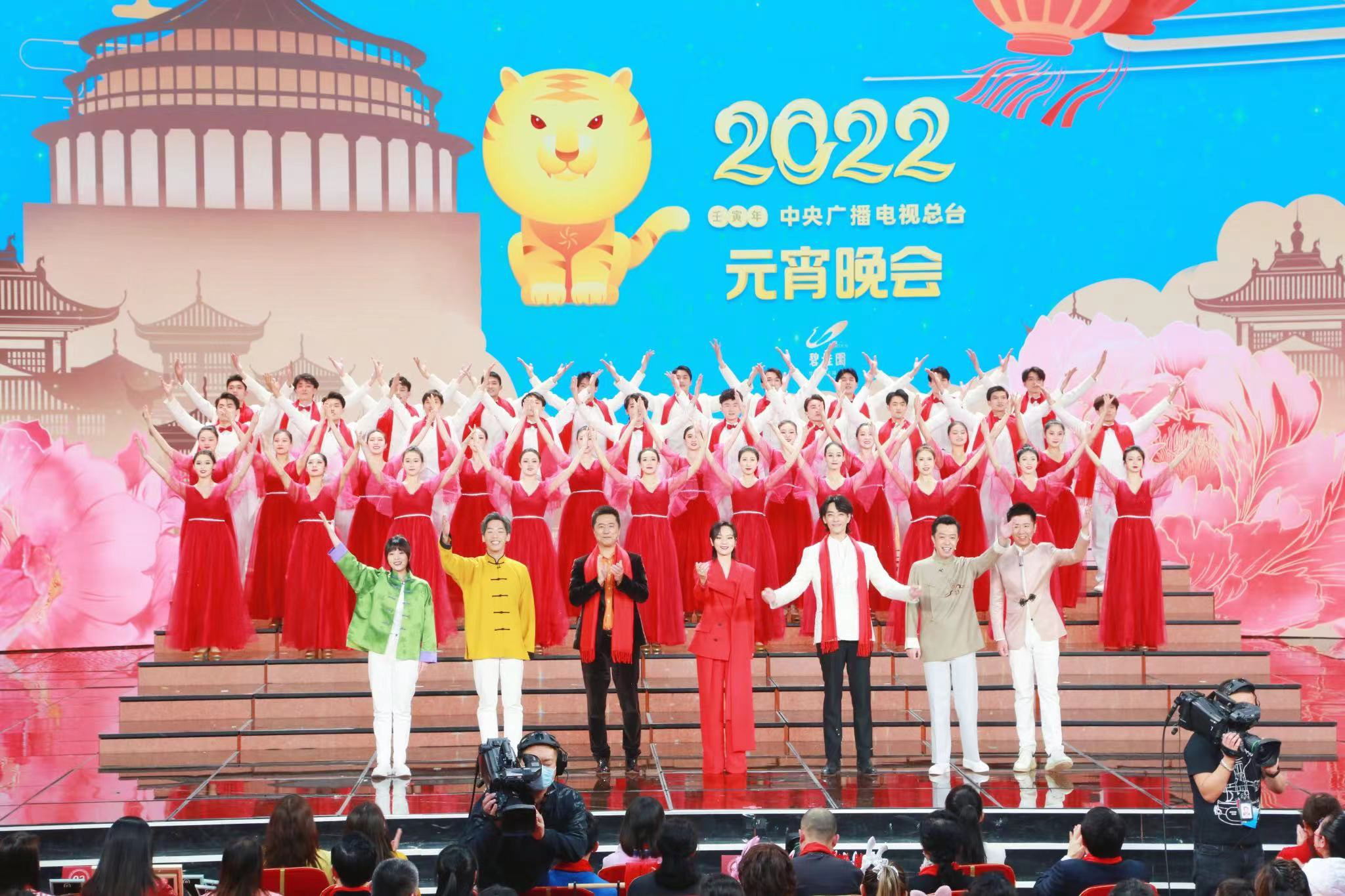
In the cross talk actor industry with men as the main force, it is rare to see female cross talk actors who make people shine at the moment. In recent years, it is Jia Ling that has made great achievements. Whether Wang Leixi’s appearance can fill this gap, the audience will wait and see. From Selling Tangyuan, we can see her mastery of the performance rhythm and her ease on the stage, which is due to her accumulated stage experience.

Wang Leixi has never been confined to a certain field. She has the courage to try new things, from the variety show to the allegro teacher. Cross-border has become commonplace for her.

Wang Leixi, a treasure girl born in 1995, has personally supported traditional culture and created many well-known songs. I hope she will bring us more surprise works in the future.







Reporter | Yang Wei
With the end of the English Open on December 18th, the snooker tournament in 2022 will enter the off-season, and the snooker Masters and the World Grand Prix will be held in January 2023, but the snooker industry entering the year is not peaceful.
On December 27th, 2022, Beijing time, the World Professional Billiards and Snooker Association (WPBSA) issued a statement that China’s Chen Zifan was suspended from participating in the World Snooker Tour due to alleged manipulation of the competition results, and this decision took effect immediately.
This is the eighth China snooker player who has been suspended for the same reason this year. Previously, at the end of October, 2022, China’s Liang Wenbo, who would have played in the 2022 Snooker English Open qualifier, was suddenly suspended, and the World Taiwan Federation immediately announced that it would launch relevant investigations.
Until December 9th, WPBSA issued a statement announcing that six China players, Liang Wenbo, Lu Ning, Li Hsing, Zhao Jianbo, Bai Langning and Chang Bingyu, were suspended for violating the WFTU Code of Conduct and allegedly manipulating the results of the competition for the purpose of gambling. Among them, Lu Ning and Chang Bingyu missed the English Open.
After another wave of unrest, on December 12, WPBSA issued another ticket, and Yan Bingtao, a 22-year-old rising star who was regarded as Ding Junhui’s successor, was also suspended for manipulating the results of the competition. At that time, Yan Bingtao, ranked 16th in the world, was about to take part in the English Open. He will also withdraw from the snooker Masters, which will kick off on January 8, 2023.
In fact, this is not the first time that a China snooker player has been punished by the World Federation of Taiwan for fixing the ball. In December, 2018, China’s Yu Delu and Cao Yupeng were sentenced to 10 years, 9 months and 6 years’ ban respectively for suspected match-fixing.
In fact, in recent ten years, the sport of snooker has been unable to cut with match-fixing. In 2013, Stephen Lee, a British star who ranked fifth in the world, was banned for 12 years for match-fixing, while Higgins, who had been ranked first in the world for a long time, was also banned for gambling, and then Bingham, a former world champion.
The constant match-fixing scandal has dealt a great blow to snooker.
Previously, although it was not comparable to the four major sports leagues in North America and the five major leagues in Europe, it had a fixed tournament coverage, a stable commercialization and bonus structure, and entered the China market relatively early, which made snooker one of the "small but beautiful" models of commercial events worldwide.
But now, in the China market,After Ding Junhui, the "first brother", China snooker has been in a hopeless situation. In addition, such a large number of players have been banned, which is undoubtedly worse.
So far this season, China players have only reached the semi-finals of the ranking tournament in the Champions League, the Northern Ireland Open and the British Championship, while in the British Championship, one of the "Three Snooker Competitions", a total of seven people participated in the China Legion, and only Ding Junhui and Zhou Yuelong broke through the first round.
selfAfter Ding Junhui won the world snooker china open and Snooker British Championship respectively in 2005, snooker gradually gained a foothold in China.
Before the epidemic, more than 5 competitions were held in China every year.,andEstablished the CBSA World Snooker Academy. This sport, which was born in the British Isles, regards China as its largest overseas market and has gained a lot.
However, the continuous fermentation of this match-fixing event will inevitably affect the image of China snooker, and its market value in China will be greatly reduced. At the same time, it will affect the future of the whole snooker movement.
To some extent, the high entry cost and low prize money have made some low-ranked players "think badly".
In recent years, due to the epidemic situation, players must go abroad frequently and get good results in large-scale ranking competitions in order to get a certain amount of bonuses. However, due to the limited overall prize money of snooker events, the income of the players is even difficult to make up for the high cost of living in Britain and Europe.
After this season’s Scottish Open, Ding Junhui, the "first brother" of China snooker, repeatedly bombarded the World Taiwan Federation with three dynamic articles on December 1st, bluntly saying, "I didn’t expect any sport to start at 11 o’clock" and "earn a lot of money to give athletes a little bonus".
It is not difficult to see that there are not a few athletes who are dissatisfied with the schedule arrangement and bonus distribution system of the World Taiwan Federation.
In fact, as the world’s top commercial billiards tournament, snooker can earn a lot of sponsorship income, including CAZOO, a British used car service provider, ROKIT, a European telecommunications company, and Red Bull, a beverage giant.
However, the competition system that ranks according to the number of prizes and the sharp decline in the prizes of events make it difficult for players with poor performance to maintain their careers. To be in2023yearoneTake the snooker Masters held in June as an example, as a snooker."One of the Three Major Events",Only before the ranking16Only athletes are eligible to participate.,But stop the first round.Players can only getone.fiveTen thousand pounds (about 125 thousand yuan) bonus.
As a leader in the industry, Ding Junhui seems to be helping China billiards explore new directions. On December 20th, the International Federation of Chinese Billiards announced that Ding Junhui would officially become the global promotion ambassador of Chinese billiards.
From March to April, 2023, during the global finals of Qiao’s Chinese Billiards Masters in 2022, the Chinese Billiards International Federation will hold a signing ceremony with Ding Junhui.
Ding Junhui said: "This is an original billiards game in China. I am more cordial and passionate about it. I am willing to contribute my own strength to its development."
At 8 o’clock, witness the news every day. CCTV will sort out the big and small things that happened around us within 24 hours for you.
[concern]
10 trillion Guangdong-Hong Kong-Macao Greater Bay Area plan is coming! Four key points must be seen.
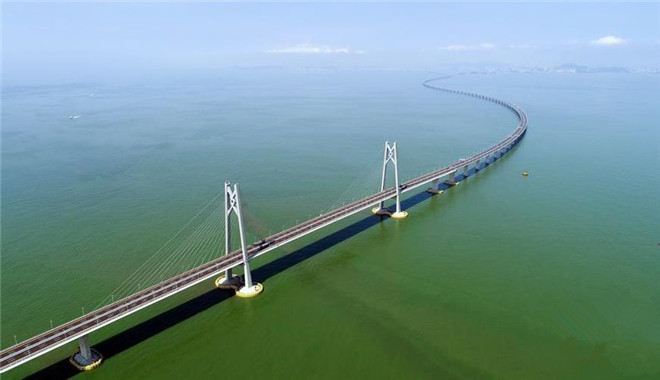
On February 18th, the Central Committee of the Communist Party of China and the State Council issued the Outline of Guangdong-Hong Kong-Macao Greater Bay Area Development Plan. The Outline consists of eleven chapters and forty-one subsections. According to the Outline, Guangdong-Hong Kong-Macao Greater Bay Area is strategically positioned as a dynamic world-class urban agglomeration.
Focus ↓ ↓ ↓
Focus 1: Promote the construction of "Guangzhou-Shenzhen-Hong Kong-Macao" science and technology innovation corridor.
Focus 2: Cultivate and expand strategic emerging industries.
Focus 3: Support insurance institutions in the Mainland, Hong Kong and Macao to carry out cross-border RMB reinsurance business.
Focus 4: Allow qualified innovative technology enterprises to enter Hong Kong’s listed fund-raising platform.
The whole lineup of the host guests of "2019 Lantern Festival Party" appeared.

The "2019 Lantern Festival Gala" by the Central Radio and Television General Station will make a splendid appearance on CCTV-1 Comprehensive Channel and CCTV-3 Variety Channel at 20: 06 on February 19th of the Lantern Festival. The theme of the whole party is "golden pig making spring", and "making trouble" and "music" are the two key words, which will be carried out around the three main lines of traditional culture, artistic performance and party features to accompany the national audience to spend the Lantern Festival. Which artists and actors sent this audio-visual feast to the national TV audience on the Lantern Festival?
[domestic]
Why did African swine fever invade frozen jiaozi? The latest response is coming.

In response to media reports that pork products such as dumplings are positive for African swine fever virus nucleic acid, the General Administration of Market Supervision and the Ministry of Agriculture and Rural Affairs have asked enterprises to immediately trace the source of pork raw materials and dispose of pork products. The two departments have sent a joint inspection team to investigate and verify the relevant situation.
The world’s first 5G railway station started construction! Deep network coverage will be completed during the year.
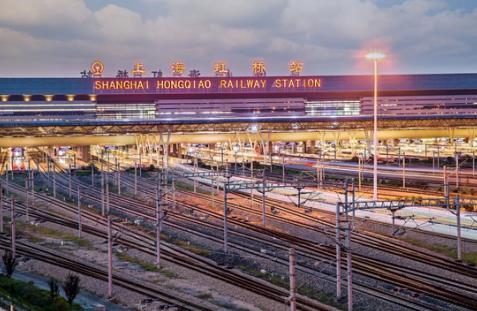
Shanghai Hongqiao Railway Station officially launched the construction of 5G network today (18th), becoming the first railway station in the world built with 5G indoor digital system. Hongqiao Railway Station plans to complete the deep coverage of 5G network in September 2019. By then, the vast number of passengers will enjoy high-speed and convenient 5G network services.
[international]
Munich Security Conference advocates multilateralism in many ways.
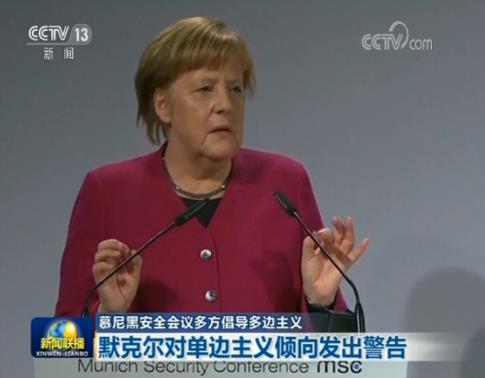
The 55th Munich Security Conference is being held in Germany with the theme of "Advocating international cooperation and maintaining multilateralism". On the 16th, politicians from many countries called for maintaining multilateralism in their speeches.
The BBC producer identified Syria’s "chemical weapons attack" as posing for the truth!

On the 13th of this month, BBC producer Liam Dalati posted on social media that after nearly six months’ investigation, he "completely confirmed" that the video of the "chemical attack" in the Syrian town of Duma last April was filmed by the director, and no one died in this hospital.
Society
The Forbidden City has to "do things" again. At the age of 600, "selling cute and playing cool" has successfully become popular.

In the 94 years since the establishment of the Forbidden Cityfirst timeHold a "Lantern Festival", the ancient buildings of the Forbidden Cityfirst timeIs lit on a large scale at night,first timeOpen to the public at night for free — — It is indeed groundbreaking for the Forbidden City to brush three "firsts" in one breath. Such largesse has no contradiction with the identity of "online celebrity" that it has created in recent years. In order to catch a glimpse of the "Night in the Forbidden City", countless netizens stayed up late to "fight the top of the Forbidden City". The collapse of the ticketing system may indicate that the server of the Forbidden City website underestimated the enthusiasm of netizens. Undoubtedly, this wave of operation once again shows the great popularity accumulated by the Forbidden City in recent years.
Rocket officer micro @ Dongfeng Express will release the first content on the 19th.
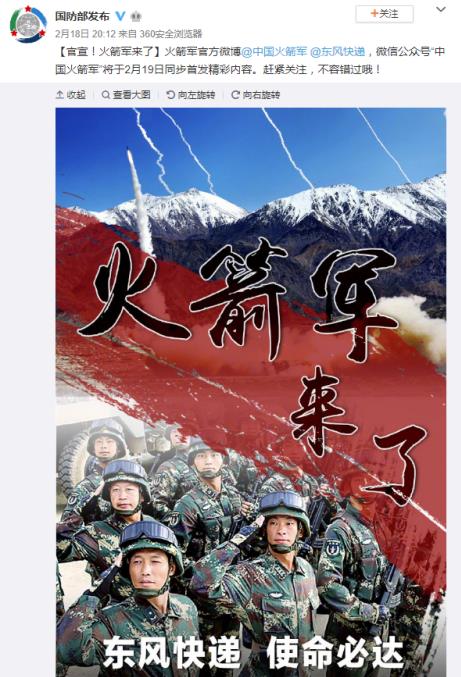
Weibo, the official rocket army, has been launched. Among them, the "Dongfeng Express" dubbed by netizens has also been officially adopted by the rocket army. However, its two official Weibo accounts have not released the contents so far. As for what the Rocket Army will "officially announce" on the 19th, it is worth looking forward to.
Never thought! When the car is in trouble, the traffic police driver turns out to be drunk driving.

On February 16, a car was stranded at a traffic light intersection in Huai ‘an because of the exhaustion of fuel. The traffic police on duty found that the driver was suspected of drunk driving in the process of helping to implement it. It turned out that the driver and his friends had been drinking together the night before until two o’clock at night. He went home to sleep, thought he was sober the next morning, and drove to work. Unexpectedly, the car ran out of gas and stopped at the intersection and was seized by the traffic police.
The old man’s motor car driver said nothing and was finally taken away by the police for five days.
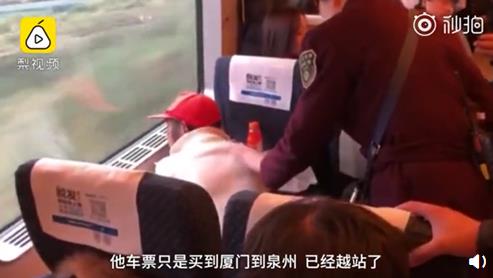
On the 16th, on the train from Xiamen to Hangzhou East, an old man refused to show his ticket and ID card, and ignored the conductor. He was found to have taken the bus over the station and refused to give up his seat. He looked out of the window alone and said nothing. In the end, he was detained for 5 days on suspicion of disturbing the order of public transport.
[Sports]
Wu Lei started in La Liga and made a history. The Spaniard drew with Valencia.

In the 24th round of La Liga, the Spaniard drew 0-0 away from Valencia. In this game, China’s Lei Wu made his debut, becoming the first China player to play in La Liga as a starter. At the same time, it was 2857 days later that China players started in the five major leagues again.
[face]
Hao Kang and Lei Jie: The "railway couple" in the news broadcast was urged to get married by the people of the whole country.
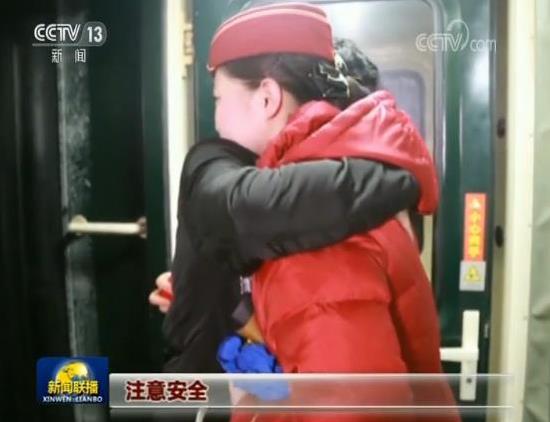
During the Spring Festival, CCTV broadcast the story of a railway couple: the railway driver Hao Kang and the flight attendant Lei Jie took different trains, so it was not easy to meet each other. At 0: 37, the train stopped, and the two met on the platform. Hao Kangsai gave Reggie a ring, and before saying "marry me", it was time to leave … After the program was broadcast, many people asked, when will the boy propose?
Liu Fucao: My family lives in Jiangnan Company, and I work in Chongqing men’s paddling across the river in the north of the Yangtze River.

The home is on the south bank of the Yangtze River, and the company is on the north bank of the Yangtze River, with a straight line distance of more than 1000 meters, but it takes nearly an hour to go to work. So from July last year, 29-year-old Liu Fucao changed to paddle across the river to go to work. It usually takes about 6 minutes to get to the other side, and when you get off work, you can row back the same way again.
Wang Ya: Retired female workers donated money for education for 30 years and donated their bodies after their death.
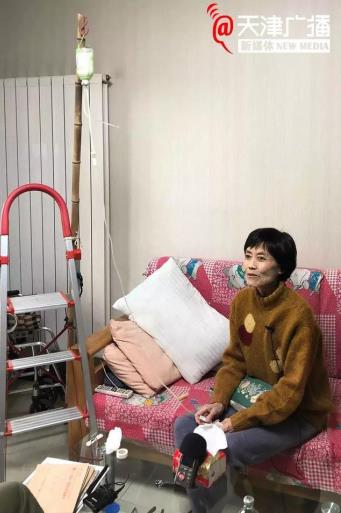
On February 16th, Wang Ya, a retired female worker in Tianjin who insisted on donating money for 30 years, died of illness. In March last year, Wang Ya was diagnosed with advanced pancreatic cancer. She gave up treatment, visited children’s homes in poor mountainous areas, donated real estate to help students, and signed a body donation agreement. After Wang Ya’s death, relatives and friends handled the donation procedures for her body.
方槐:开国少将辞世 曾在开国大典驾机飞过天安门
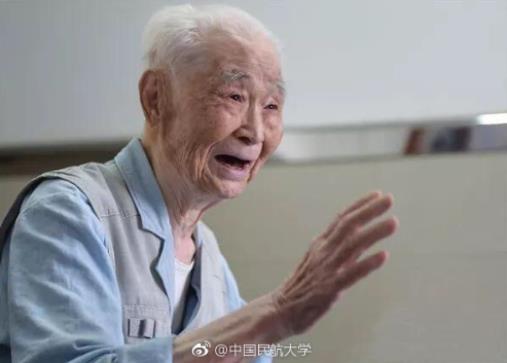
据中国民航大学官方微博消息,开国少将、原武汉军区空军副司令员方槐于2019年2月16日在武汉逝世,享年102岁。目前开国将星仅存13颗,他们基本都是在红军时期就参加革命,平均年龄已在百岁上下。
鲁道夫:7岁百米13秒48!他可能是世界上跑得最快的孩子

近日,美国7岁男孩鲁道夫在百米短跑比赛中,以13秒48的成绩打破美国8岁以下百米全国纪录。据悉,鲁道夫4岁起就接受专业训练,7岁已拥有6块腹肌和无数奖牌。这个月初,鲁道夫的成绩单也被晒出:音乐、体育、科学和计算机都是A。鲁道夫的爸爸说,无论课堂还是运动场,他都需继续努力。
米提:以色列车站检票机“淡定猫”走红网络

最近,在以色列佩塔提克瓦,一只名叫的猫成了“网红”。在网友拍摄的视频中,“米提”卧在自动检票机上,表情“淡定”地迎接乘客,仿佛一名老道的检票员……
明天8点见!



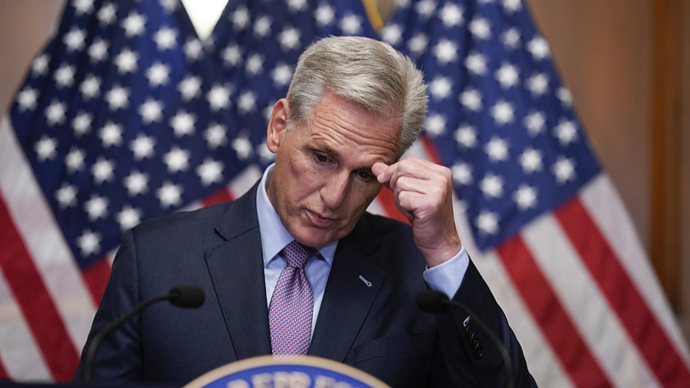
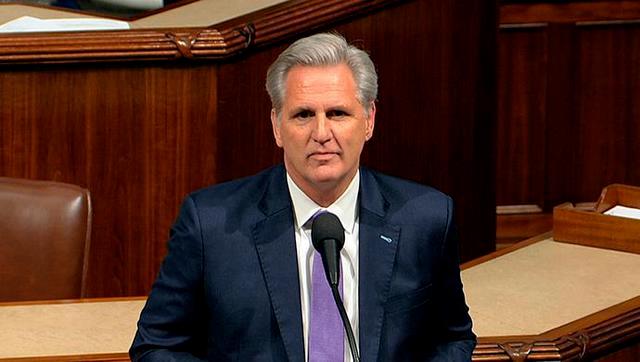
Only nine months after taking office, Kevin McCarthy, the third person in the United States and Speaker of the House of Representatives, was removed from office on October 3. CNN said that this is the first time in American history that the Speaker of the House of Representatives was voted out.
Not only did he create history when he left office, but McCarthy also staged an embarrassing farce of "once in a hundred years" when he took office at the beginning of this year-after four days and 15 rounds of voting, he barely became the speaker, which was the longest voting in the House of Representatives election for more than 160 years since the Civil War.
Unexpectedly, McCarthy was kicked off the speaker’s position before his ass got hot after he got to the top.
According to Lv Xiang, an expert on American issues at China Academy of Social Sciences, McCarthy’s dismissal was expected. In the initial campaign tug-of-war, McCarthy agreed to lower the threshold of the "recall motion" in order to win the votes of ultra-conservatives in the party, which in itself laid the groundwork for his stepping down. "The end has long been doomed, but I was not sure when this day would come."

Feeling of being dismissed"great"
Judging from the voting results of the recall motion, there were 216 votes in favor and 210 votes against it. In the House of Representatives, which has a majority of Republican seats, McCarthy obviously lost some of his party support votes, that is, some Republican lawmakers "defected" and voted in favor of the recall of McCarthy together with Democratic lawmakers.
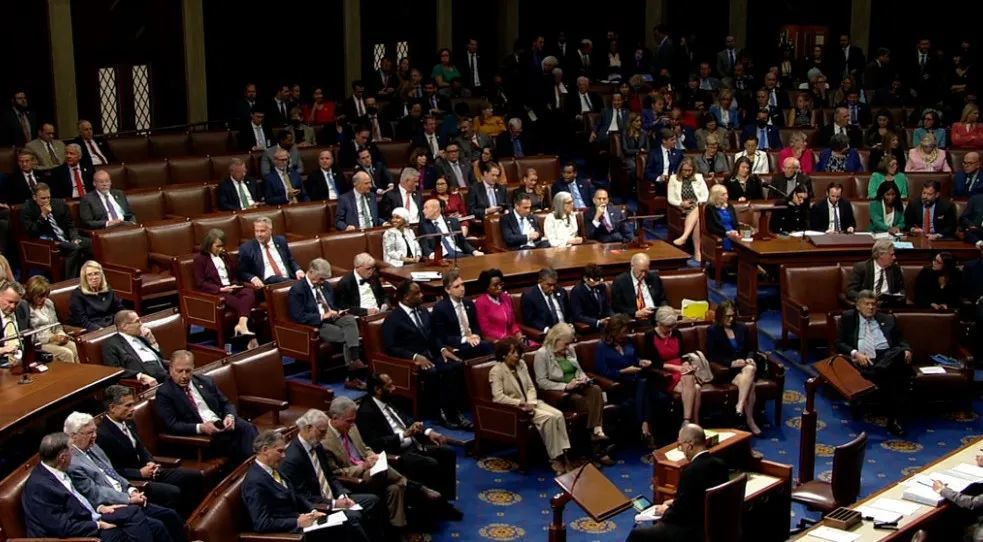
·The picture of the US House of Representatives voting on the resolution to recall Republican Speaker McCarthy.
Why was McCarthy "abandoned" by the Republican Party? The direct cause is the parliamentary dispute over the appropriation bill.
The fiscal year 2023 in the United States ended on September 30, and the Democratic Party and the Republican Party had been fighting endlessly over the federal budget appropriation bill for the new fiscal year. Just at the last moment when the government was on the verge of running out of money and preparing to close the door, the short-term appropriation bill was passed on the evening of September 30, local time, temporarily avoiding the crisis of the US federal government’s lockout again.
In fact, the Republican Party originally wanted to give the Democratic US President Biden a "color" look through the appropriation bill.
Ultra-conservatives in the Republican Party have been pressuring McCarthy not to support any provisional appropriation bill, and even threatened to let McCarthy step down once the provisional appropriation bill was passed.
As a result, the Republicans designed it for a long time, and McCarthy broke the chain at the last minute and compromised with the Democratic Party, so that the appropriation bill was passed.
The appropriation bill was passed, and McCarthy was regarded as "meritorious" on the Democratic side, but it also angered the Republican Party and became the fuse for his dismissal.
After being dismissed, McCarthy held a press conference and said that he felt "great" and that he would not run for the Speaker again.
Some media analysts said that McCarthy’s abandonment of re-election is actually saving face. Although he can run for election again immediately according to the law, since he was elected as the speaker after a full 15 rounds of voting last time, it will definitely not be easy if he runs for election again.
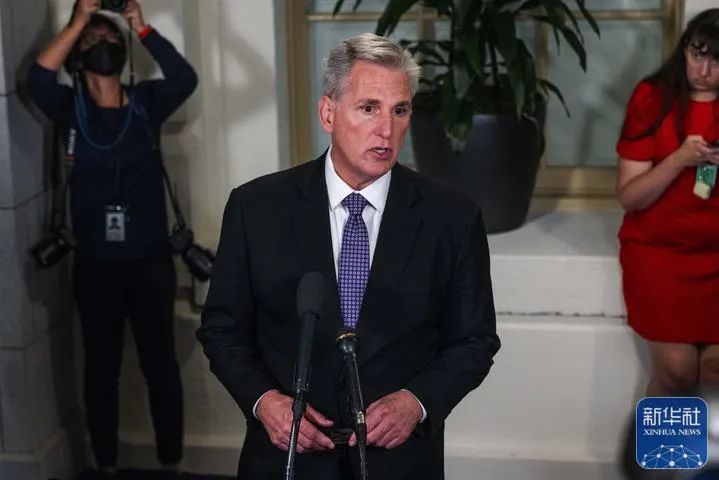
·This is McCarthy, Speaker of the House of Representatives of the Republican Party, filmed in Washington, DC on September 29th. Xinhua news agency
During his nine months as Speaker of the House of Representatives, McCarthy was repeatedly challenged by ultra-conservatives in the Republican Party.
Earlier this year, the United States almost defaulted on its debt. McCarthy and Biden reached a compromise in May, and Congress passed a bill on the government debt ceiling. At that time, the ultra-conservatives in the Republican Party thought that McCarthy had not pushed hard enough to cut government spending, and once considered proposing a motion to remove McCarthy.
It’s not that McCarthy hasn’t thought about "saving himself". In September this year, on the issue of impeaching Biden, McCarthy handed out an "olive branch" to the radicals in the Republican Party.
On September 12, McCarthy said in Congress that the investigation of Biden’s family members by the House Oversight and Accountability Committee found that Biden’s family had a "culture of corruption" and there might be "abuse of power, obstruction of justice and corruption", so "I announced today that the House Committee will formally launch an impeachment investigation against President Biden".
According to US media reports, McCarthy announced an impeachment investigation against Biden, to some extent to meet the requirements of the far-right conservatives in the Republican Party in the House of Representatives. Some conservative Republican lawmakers said that the impeachment investigation against Biden was only a "small step" and "we should speed up the pace of action". If McCarthy moves slowly, measures may be taken to "step down".
McCarthy, who was threatened to "step down" without a word, was completely caught.

"An actor with poor acting skills"
We can "unite" Republicans by impeaching Biden, or compromise with Democrats for the benefit. It is precisely because of this characteristic of have it both ways that McCarthy is described by the American media as "the best congressional chameleon".
"McCarthy is a typical opportunist. Generally speaking, he is a Republican, but staunch Republicans don’t trust him. " Lu Xiang said that after McCarthy took office, he tried to get support from many parties, but the Republican party could not understand it. He would also play the idea of the Democratic Party and do something to please it. But in the end, McCarthy, who used to be a "fence-sitter" and "fence-sitter", only ended up being dismissed.
In the American political arena where money is paramount, McCarthy’s history can be described as "another way". He can sit in the "third place" with "excellent interpersonal skills".
In 1965, McCarthy was born into an ordinary family in California. His father was a fireman and his grandfather owned a small ranch. As an adult, McCarthy worked as a worker and opened a sandwich shop. In 1987, 22-year-old McCarthy sold the store and used the money to study at California State University.
During his college years, McCarthy met the "Bole" who changed his fate, then Republican Congressman Bill Thomas. McCarthy followed Thomas into the Republican Party and grew from an intern to a long-term congressman around Thomas.
In 2002, 37-year-old McCarthy was elected to the California House of Representatives. In 2007, he entered the Congress to take over the position of Representative Thomas, and inherited his political legacy.
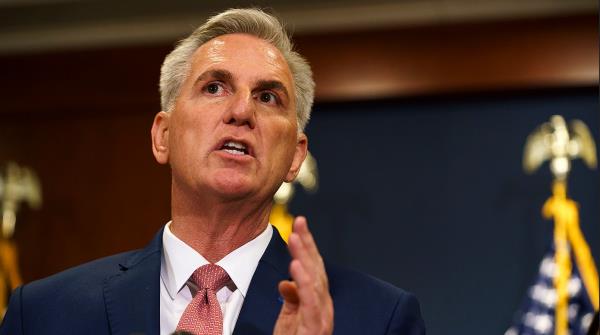
·McCarthy.
Since he entered Congress, McCarthy has aimed at the throne of the Speaker of the House of Representatives. He brought his "interpersonal skills" into full play.
For example, McCarthy can name all members’ families and even know the birthdays of members’ children. He often appears in non-work places such as the National Assembly Gym, creating opportunities to "bump into" colleagues and talk with them. He can always say the right words at the right time to make the other person feel happy.
However, McCarthy, although he got along well in Congress, was not loved. An insider working in the House of Representatives once said to the American media: Everyone knows this sentence-McCarthy really cares only about himself.
In 2013, the American drama "House of Cards" started shooting, and kevinspacey fowler, the leading actor, found McCarthy to learn from the scriptures. McCarthy later admitted that he had taken Spacey to "experience life" in Congress. Spacey concluded: "The politicians on Capitol Hill are all bad actors."

·Stills of House of Cards.

A "failed country"
This time, it was Matt Gates, a Republican Congressman from Florida, who proposed to recall McCarthy.
Gates has a long history of not liking McCarthy.
In January this year, when McCarthy sprinted for the position of Speaker, Gates was the biggest obstacle.
After the mid-term elections, the Republican Party won 222 seats and successfully controlled the House of Representatives. As the Republican leader of the House of Representatives, McCarthy should have no suspense in taking over as Speaker of the House of Representatives.
However, the original "going through the motions" vote was deadlocked for four days, and McCarthy did not become the speaker until the fifteenth round of voting.
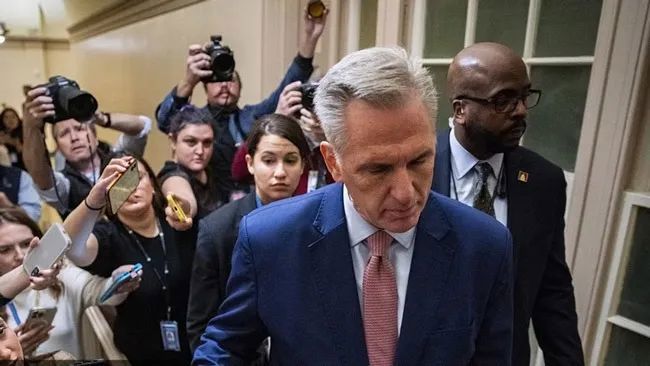
·McCarthy was still not elected after the eleventh round of voting.
In the fourteenth round of voting, at the critical moment when McCarthy was only one vote away from being elected, Gates once again cast an abstention vote.
Seeing Gates "spoiling the game", McCarthy turned pale with anger and got up and went to him to persuade him to change his position. But gates didn’t give in at all, and he held out his finger and choked with McCarthy.
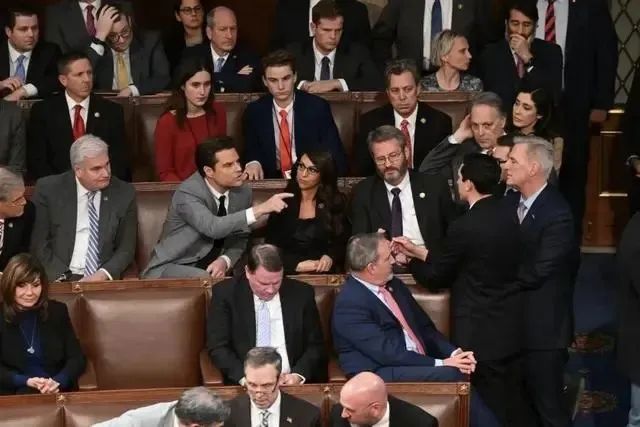
·On January 6, 2023, on the fourth day of the election of the Speaker of the House of Representatives, McCarthy and Gates quarreled.
In the end, McCarthy was barely elected by one vote, which was behind the compromise he made by abandoning his dignity. One of the compromises is that McCarthy agreed to lower the threshold for initiating a motion to recall the Speaker of the House of Representatives-any member of the House of Representatives can propose it, instead of the previous requirement of obtaining the support of a majority of members of one party.
These compromises were called "the devil’s deal" by the Washington Post. Democratic Rep. McGovern sarcastically said: "McCarthy has given up everything, including dignity."
Wearing shackles, McCarthy became the speaker. I just didn’t expect that the speaker who was elected after 15 rounds of voting was dismissed after one round of voting.
It is worth mentioning that Gates, who constantly advocates putting "shackles" on McCarthy, comes from the far-right liberal party group.
This is a group composed of far-right Republican lawmakers who advocate conservatism and small government, and support budget cuts and decentralization of the House of Representatives. Of the 20 Republican lawmakers who opposed McCarthy’s election as Speaker, 19 were closely related to the Liberal Party. Of the eight Republicans who voted to remove McCarthy, six were members of the Liberal Party.
The number of liberal party members is not large, but the victory lies in unity. If more than 80% of the internal members are against a proposal, others will choose to follow the ticket.
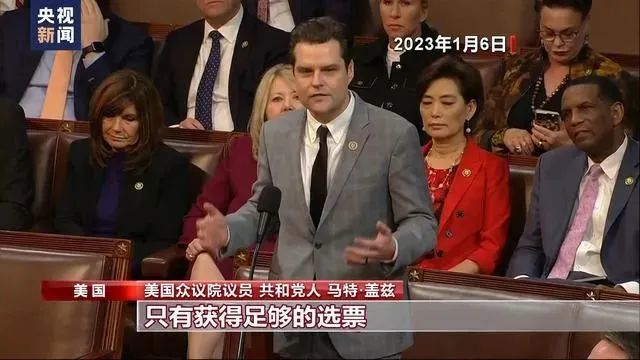
·Before McCarthy took office on January 7th this year, Matt Gates made a speech against McCarthy on January 6th local time.
Lu Xiang believes that the Liberal Party actually inherited the "mantle" of the Tea Party.
Previously, a landmark event of Republican infighting occurred in 2015. At that time, the Tea Party forced john boehner, Speaker of the House of Representatives and a Republican, to resign, and the situation was exactly the same as this one.
"The liberal party group is like a small group in the majority party, and it can also be understood as a small shareholder in a large company, and it is a decisive minority shareholder." Lu Xiang believes that the small party groups differentiated within the majority party can achieve the role of "the majority obeys the minority"-although you can’t do anything big, you can’t do anything.
It is difficult for the two parties to cooperate with each other, the internal struggles among political parties continue, and minority groups hold the decision-making power … The American media described the Republicans in the House of Representatives as a "failed country".
Before the new speaker took office, McCarthy temporarily appointed his confidant Patrick McHenry as the interim speaker. The BBC believes that whoever succeeds McCarthy will face a broken mess.
How to deal with the mess for the time being, mchenry’s new official took office, and issued a written order, demanding that former US House Speaker nancy pelosi vacate the office of the Capitol immediately, and that the office should return to the right path, "for the use of the Speaker only".
Editor-in-Chief: Qin Hong
Text Editor: Fang Ying
Author: global person Chen Jiali Mao Yufei
Source: vision china
Photo editor: Xu Jiamin
In the autumn season, the colors of Panshan Mountain become richer with the change of seasons, and the enthusiasm that nature has accumulated for a year will be released in this colorful season. No matter the city or the countryside, there are beautiful pictures everywhere. The beautiful scenery has also attracted many citizens to go out to take photos, enjoy leisure and enjoy the pleasant time in autumn.
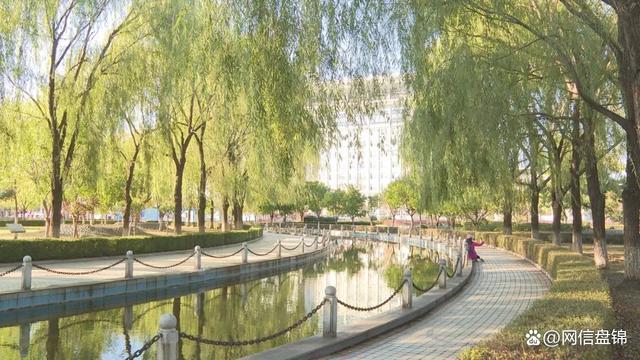
Strolling in the county seat, colorful autumn scenery can be seen everywhere, and charming autumn colors spread like ink paintings in the city.The green leaves in my memory unconsciously changed into Huang Cancan’s new clothes, and mottled sunlight leaked between the leaves, interpreting the charming autumn colors.The trees on both sides of the road are covered with golden gauze, and the leaves dress up the main road as a fairy tale avenue, giving people the feeling of "walking in the picture".In the thick autumn, leaves fall with the wind, and the strong natural beauty adds a touch of beautiful color to the bleak autumn.The park in autumn is also particularly moving. Looking around, the trees are yellow and green, colorful and colorful, and the grass adjacent to it is thick and green. The two set off each other and embellish each other. Many citizens twist yangko under the tree or follow cheerful music, or exercise with their partners, or enjoy the beautiful scenery and take photos as a souvenir. A limited edition of autumn scenery seems to be an exclusive romance for the city.
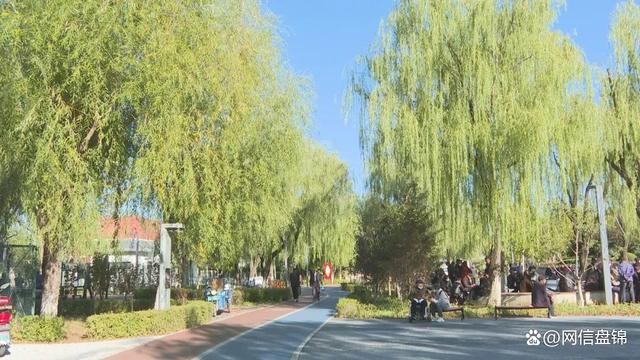
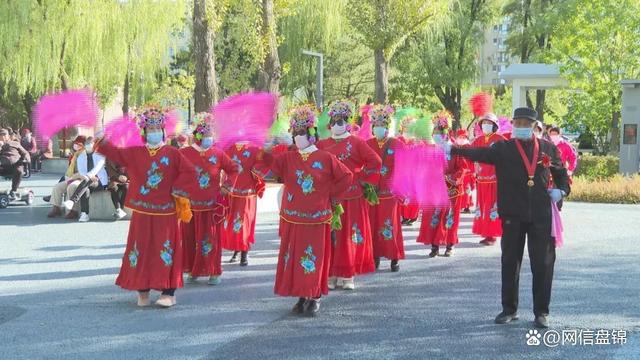
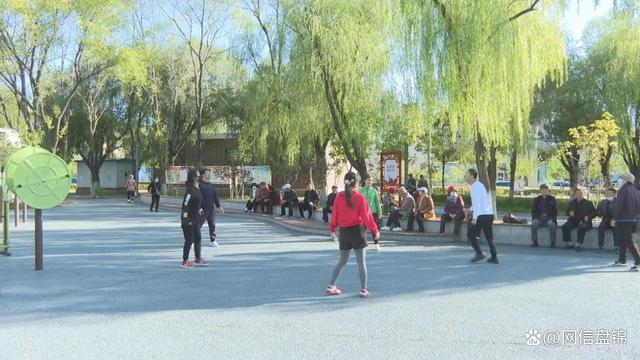
Woye Liujin sings a bumper year, and Panshan land is picturesque.Full ears of rice are the "signalman" of autumn. In the vast fields, the harvested rice fields reflect golden light in the autumn sunshine, the wind blows rice waves, and the nose is full of fragrant rice. The golden rice fields and beautiful villages complement each other and are beautiful.Looking at the village, the neat and flat hardened road passes through the village, connecting the rice fields and houses. The colorful autumn scene is like oil painting, which makes people linger.

I say autumn is better than spring.Autumn is very different from spring. It is fresh and bright, and it doesn’t need to decorate itself with noisy bright colors. It has its own fullness and enthusiasm, as well as its own vastness and richness.In this beautiful autumn, let’s stop in a hurry, embrace the harvest and usher in the accumulation together, enjoy the tenderness and color of autumn and enjoy the moving music played by nature!
Source: Impression Panshan
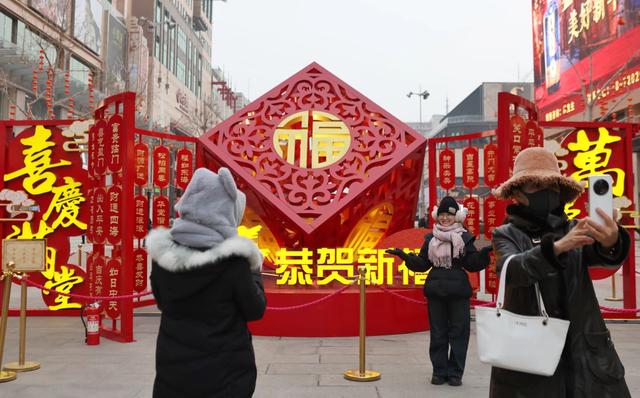



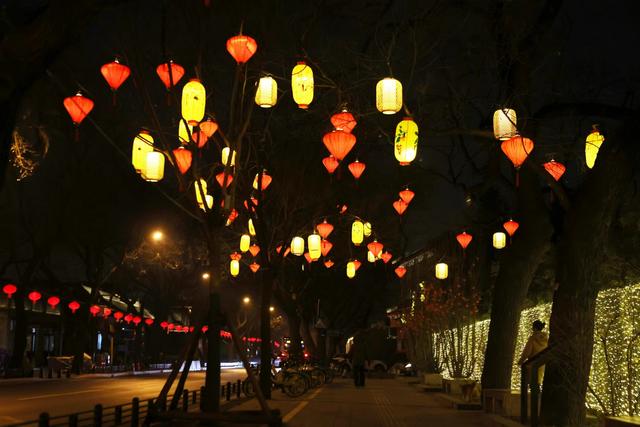
With the increasing requirements of enterprises for academic qualifications, many employees will also use their spare time to improve their academic qualifications. The form of self-study exam has become the choice of many people. Then, where can I find the location of the self-study exam?
Click to enter:If you have any questions about the self-study exam, don’t know how to choose the main examination institution and major, and don’t know the local policy of self-study exam, click to learn now > >

1. Candidates can go to the self-study office for consultation when applying for the self-study exam.
2. Admission ticket inquiry: The self-taught admission ticket contains information such as the test site address, examination room, seat number and test subjects.
3. Online inquiry: Candidates can log in to the online registration system of the self-taught examination of the Provincial Education Examinations Institute, select the admission ticket or the examination notice, and enter the account number and password to inquire about the seat number information of the examination center.
4. Telephone inquiry: Candidates can directly call the self-study office in their urban areas for consultation, report their ID number and name, and the staff of the self-study office will help with the inquiry.
If the candidates need to go to the city to take the exam in a township, or if the candidates live in the city and need to go to another city to take the exam, it takes several hours by car to reach the test center, and the long distance on the day of the exam may affect the exam. There are the following solutions, which can be used as reference for the exam. Choose the method that suits you:
1. Candidates should step on the spot in advance to avoid being too late to panic on the day of the exam.
2. If you can’t attend the examination room on the day of the exam, candidates should book a hotel at the attachment of the test center one day in advance and stay in the hotel to reduce the fatigue of running around on the day of the exam.
1. Self-taught admission ticket and ID card
The admission ticket and my valid ID card must be brought. Without the admission ticket, students who can’t enter the examination room and haven’t printed the admission ticket can print it as soon as possible. It is suggested that you can prepare more copies in advance and open them in different locations to prevent them from being found temporarily.
2. Gel pens, 2B pencils, erasers, compasses and triangles.
The above is related to the adult self-study exam, and candidates can use it as a reference, which is subject to the official announcement! Candidates want to get more information about the self-taught examination, such as the registration time, examination time, application conditions, preparation knowledge, relevant news, etc. Please pay attention to the online self-taught examination channel of China Education.
Popular recommendation:
If you have any questions about the self-study exam, don’t know how to choose the main examination institution and major, and don’t know the local policy of self-study exam, click to learn now > >
Recommended reading:
In April, 2024, all provinces registered for self-study exams in official website.
Summary of Registration Time and Entrance of Self-taught Exams in April 2024 by Provinces